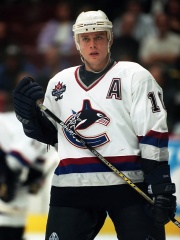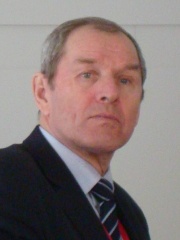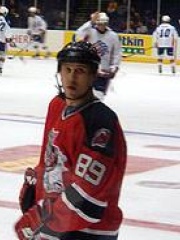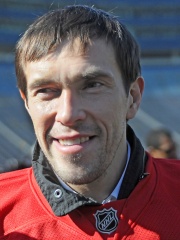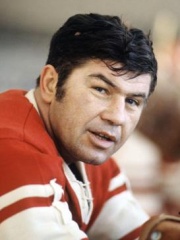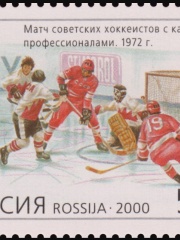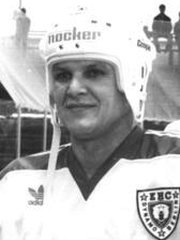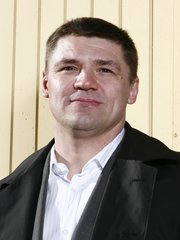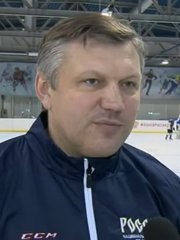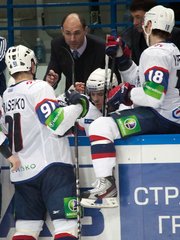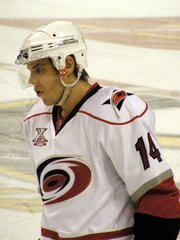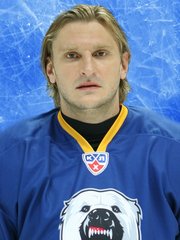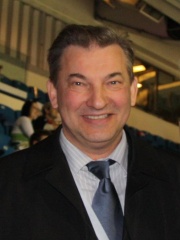
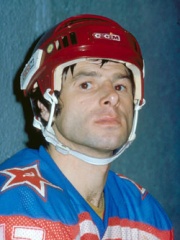
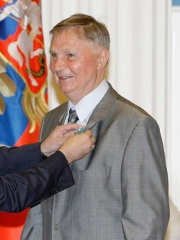
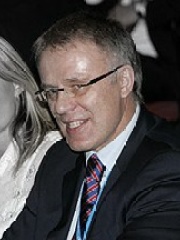
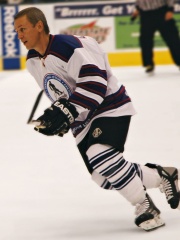
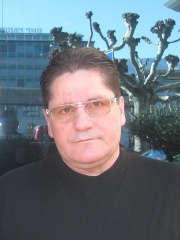
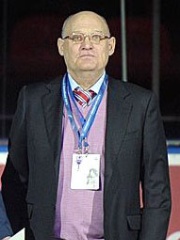
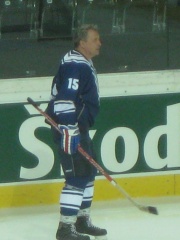
The Most Famous
HOCKEY PLAYERS from Russia
This page contains a list of the greatest Russian Hockey Players. The pantheon dataset contains 676 Hockey Players, 110 of which were born in Russia. This makes Russia the birth place of the 2nd most number of Hockey Players.
Top 10
The following people are considered by Pantheon to be the top 10 most legendary Russian Hockey Players of all time. This list of famous Russian Hockey Players is sorted by HPI (Historical Popularity Index), a metric that aggregates information on a biography's online popularity. Visit the rankings page to view the entire list of Russian Hockey Players.

1. Vladislav Tretiak (b. 1952)
With an HPI of 64.13, Vladislav Tretiak is the most famous Russian Hockey Player. His biography has been translated into 43 different languages on wikipedia.
Vladislav Aleksandrovich Tretiak MP (Russian: Владислав Александрович Третьяк, IPA: [trʲɪˈtʲjak]; born 25 April 1952) is a Russian former goaltender for the Soviet Union national ice hockey team. He was inducted into the inaugural class of the International Ice Hockey Federation (IIHF) Hall of Fame in 1997. Considered to be one of the greatest goaltenders in the history of the sport, he was voted one of six players to the IIHF Centennial All-Star Team in a poll conducted by a group of 56 experts from 16 countries. Tretiak is the current president of the Ice Hockey Federation of Russia and was the general manager of the Russian 2010 Winter Olympic team.

2. Valeri Kharlamov (1948 - 1981)
With an HPI of 63.50, Valeri Kharlamov is the 2nd most famous Russian Hockey Player. His biography has been translated into 41 different languages.
Valeri Borisovich Kharlamov (Russian: Вале́рий Бори́сович Харла́мов, IPA: [vɐˈlʲerʲɪj bɐˈrʲisəvʲɪtɕ xɐrˈlaməf]; 14 January 1948 – 27 August 1981) was a Russian ice hockey forward who played for CSKA Moscow in the Soviet League from 1967 until his death in 1981. Kharlamov was a speedy, intelligent, skilled and dominant player, being named the Soviet Championship League most valuable player in 1972 and 1973. An offensive player who was considered very creative on the ice, he also led the league in scoring in 1972. He was also a gifted skater who was able to make plays at top speed. Kharlamov was considered one of the best players of his era, as well as one of the greatest players of all time. In international play, Kharlamov represented the Soviet Union at 11 World Championships, winning 8 gold medals, 2 silvers and 1 bronze. He participated in three Winter Olympics, 1972, 1976 and 1980, finishing with two gold medals and one silver, and participated in the 1972 Summit Series against Team Canada. He spent most of his career playing on a line with Vladimir Petrov and Boris Mikhailov, and this trio is considered one of the best in the history of ice hockey. Kharlamov was killed in a car accident in 1981. After his death, Kharlamov was elected to the International Ice Hockey Federation Hall of Fame, the Hockey Hall of Fame, the Russian Hockey Hall of Fame and was selected as one of the forwards on the IIHF Centennial All-Star Team. The Kharlamov Trophy is presented annually to the best Russian hockey player in the National Hockey League, as chosen by his peers. The Kharlamov Cup is presented to the champion of the Minor Hockey League playoffs, and the Kontinental Hockey League named one of their four divisions after him.

3. Viktor Tikhonov (1930 - 2014)
With an HPI of 61.49, Viktor Tikhonov is the 3rd most famous Russian Hockey Player. His biography has been translated into 29 different languages.
Viktor Vasilyevich Tikhonov (Russian: Виктор Васильевич Тихонов; 4 June 1930 – 24 November 2014) was a Russian ice hockey player and coach. Tikhonov was a defenceman with VVS Moscow and Dynamo Moscow from 1949 to 1963, winning four national championships. He was the coach of the Soviet team when it was the dominant team in international play, winning eight World Championship gold medals, as well as Olympic gold medals in 1984, 1988 and 1992. Tikhonov also led CSKA Moscow to twelve consecutive league championships. He was named to the IIHF Hall of Fame as a builder in 1998.

4. Viacheslav Fetisov (b. 1958)
With an HPI of 58.78, Viacheslav Fetisov is the 4th most famous Russian Hockey Player. His biography has been translated into 26 different languages.
Viacheslav Alexandrovich "Slava" Fetisov MP (Russian: Вячеслав Александрович Фетисов; born 20 April 1958) is a Russian former professional ice hockey defenceman, coach, politician and sports official. He played for HC CSKA Moscow for 13 seasons before joining the National Hockey League (NHL), where he played with the New Jersey Devils and Detroit Red Wings. With the Wings, he won back-to-back Stanley Cups and was part of the team's Russian Five unit. After retiring from his playing career, he became the assistant coach for the New Jersey Devils. Having a very successful four years, he helped get the team to two Stanley Cup finals and one Stanley Cup victory. In addition to that, he won two Olympic gold medals and seven world championships. His Stanley Cup wins, Olympic gold medals, and World Championship wins make him a member of the sport's prestigious Triple Gold Club. Fetisov was instrumental in breaking the barrier that had prevented Soviet players from leaving the Soviet Union to join the NHL. His actions not only resulted in a number of top Soviet players joining the NHL, but encouraged many of the best players from all over Europe to go to North America. Internationally, he was a long-time captain for the Soviet Union national team and is a two-time Olympic champion. In 2002, Fetisov led the Russian Ice Hockey Olympic team as GM and head coach, attaining a bronze medal. Considered one of the best defencemen of all time, he was voted as one of six players to the International Ice Hockey Federation's (IIHF) Centennial All-Star Team. He was inducted into the IIHF Hall of Fame in 2005. After retiring as a coach, Fetisov embarked on a political and executive career. After the 2002 Winter Olympics, Russian President Vladimir Putin offered him the position as Minister of Sport, a post he held until 2008. He has the federal state civilian service rank of 1st class Active State Councillor of the Russian Federation. He is a member of the upper house of the Federal Assembly of Russia, the Federation Council representing Primorsky Krai, the founder and chairman of the KHL's board of directors and chair of the World Anti-Doping Agency (WADA) Athletes Committee. Fetisov was president of Russian ice hockey club HC CSKA Moscow of the Kontinental Hockey League (KHL). He was also the key member of the bidding committee that presented the Sochi 2014 proposal to the IOC in Guatemala in 2007, when a city was being chosen to host the 2014 Winter Olympics. Fetisov was Deputy of the State Duma of the Federal Assembly of the Russian Federation of the VII convocation, First Deputy Chairman of the State Duma Committee on Physical Culture, Sports, Tourism and Youth Affairs since 5 October 2016. Fetisov is a member of the Supreme Council of the United Russia party.
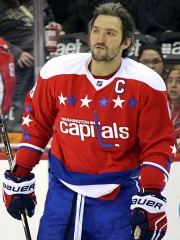
5. Alexander Ovechkin (b. 1985)
With an HPI of 58.52, Alexander Ovechkin is the 5th most famous Russian Hockey Player. His biography has been translated into 41 different languages.
Alexander Mikhailovich Ovechkin (Russian: Алексaндр Михайлович Овечкин, romanized: Aleksandr Mikhaylovich Ovechkin, pronounced [ɐlʲɪˈksandr ɐˈvʲetɕkʲɪn]; born 17 September 1985) is a Russian professional ice hockey player who is a left winger and captain for the Washington Capitals of the National Hockey League (NHL). Nicknamed "the Great 8" (in reference to his jersey number) and "Ovi", as well as "Alexander the Great" (Russian: Александр Великий) by Russian media, Ovechkin has scored the most career goals in NHL regular season history, and is the only player in NHL history to have scored 900 regular season goals. Ovechkin began his professional career with Dynamo Moscow of the Russian Superleague in 2001, playing there for four seasons. Ovechkin was selected by the Capitals first overall in the 2004 NHL Entry Draft. In the 2005–06 season, Ovechkin captured the Calder Memorial Trophy as rookie of the year and finished third overall in league scoring. Ovechkin has won the Maurice "Rocket" Richard Trophy as the NHL's leading goal scorer a record nine times and been runner-up once. He holds the NHL record for most 40-goal seasons with thirteen, and shares with Mike Bossy and Wayne Gretzky the record for most 50-goal campaigns with nine. He is the only player to have tallied 200 or more goals in three different decades, with 245 in the 2000s, 437 in the 2010s, and 213 in the 2020s. He also holds multiple other NHL records, including the most power play goals, most goals in away games, most overtime goals, most game-winning goals, most individual goalies scored upon, and most goals with one team. He has won the Hart Memorial Trophy for most valuable player three times (in 2008, 2009, and 2013) while also being a finalist two other times (2010 and 2015), and the award for best player as voted on by the National Hockey League Players' Association three times (2008, 2009, and 2010) while also being a finalist two other times (2013 and 2015). In 2018, the Capitals won the Stanley Cup for the first time, and Ovechkin was awarded the Conn Smythe Trophy for most valuable player in the 2018 playoffs. He has also been named to the NHL first All-Star team eight times, and the second All-Star team four times. In 2017, Ovechkin was named one of the 100 Greatest NHL Players of all time. Internationally, Ovechkin has represented Russia in multiple tournaments. His first IIHF tournament was the 2002 World U18 Championship. The following year he made his debut at the World Junior Championship, helping Russia win the gold medal. He played two more years at the World Juniors, as well as once more at the World U18 Championships. Ovechkin's first senior tournament was the 2004 World Championship, and he also played in the World Cup that year. Ovechkin has also played for Russia at the Winter Olympics in 2006, 2010, and 2014. Overall, Ovechkin has represented Russia at thirteen World Championships and three Olympics in his career, winning the World Championship three times.

6. Igor Larionov (b. 1960)
With an HPI of 57.05, Igor Larionov is the 6th most famous Russian Hockey Player. His biography has been translated into 24 different languages.
Igor Nikolayevich Larionov (Russian: Игорь Николаевич Ларионов; born 3 December 1960) is a Russian ice hockey coach, sports agent and former professional ice hockey player, known as "the Professor". Considered one of the best hockey players of all time, he, along with Viacheslav Fetisov, were instrumental in forcing the Soviet government to let Soviet players compete in the National Hockey League (NHL). During his career, which lasted from 1977 to 2006, he primarily played the centre position. Larionov won the Stanley Cup three times with the Detroit Red Wings (1997, 1998, 2002) and was inducted as a member of the Hockey Hall of Fame on 10 November 2008. He was also a member of Detroit's famed Russian Five line. His international career was recognized with induction into the IIHF Hall of Fame in 2008.

7. Sergei Makarov (b. 1958)
With an HPI of 56.96, Sergei Makarov is the 7th most famous Russian Hockey Player. His biography has been translated into 31 different languages.
Sergei Mikhailovich Makarov (Russian: Серге́й Миха́йлович Мака́ров; born 19 June 1958) is a Russian former professional ice hockey right wing. In the Soviet Union, Makarov played 11 championship seasons with CSKA Moscow, winning the Soviet Player of the Year award (also known as Soviet MVP) three times. Together with Igor Larionov and Vladimir Krutov, they formed the KLM Line, one of the most talented and feared lines ever to play hockey. He later played in the National Hockey League with the Calgary Flames, and won the Calder Memorial Trophy as rookie of the year at the age of 31. Internationally, Makarov played on the gold medal-winning Soviet national team at eight World Championships, and in the 1981 Canada Cup. At the Winter Olympics, he won the gold medal in 1984 and 1988, and a silver in 1980. He was awarded Order of the Red Banner of Labour (1984). In 2001, Makarov was inducted into the IIHF Hall of Fame. In 2016, he was inducted into the Hockey Hall of Fame. He was voted one of six players to the International Ice Hockey Federation's (IIHF) Centennial All-Star Team in a poll conducted by a group of 56 experts from 16 countries.

8. Vladimir Petrov (1947 - 2017)
With an HPI of 56.57, Vladimir Petrov is the 8th most famous Russian Hockey Player. His biography has been translated into 24 different languages.
Vladimir Vladimirovich Petrov (Russian: Влади́мир Влади́мирович Петро́в; 30 June 1947 – 28 February 2017) was a Russian ice hockey player, Olympic gold (1972, 1976) and silver medalist (1980). Born in Krasnogorsk, Petrov played in the Soviet Ice Hockey League for Krylya Sovetov, Moscow (from 1965 to 1967), CSKA Moscow (from 1967 to 1981) and SKA, Leningrad (from 1981 to 1983). At CSKA Moscow and the Soviet national team, he, together with Boris Mikhailov and Valeri Kharlamov, formed one of the best offensive lines ever. Petrov played for the Soviet team in three Winter Olympics, 1972 Soviet Union–Canada Summit Series and many IIHF World Championships. He is the fourth all-time leading top scorer at the World Championships, with 154 points (74 goals and 80 assists) in 102 games. He also scored 7 points (3 goals and 4 assists) in 8 games at the Summit Series. Petrov retired from ice hockey in 1983. In the mid-1990s, Petrov was the president of Russian Ice Hockey Federation. In 2006, he was enshrined into the IIHF Hall of Fame. Petrov died in 2017 and was buried in the Federal Military Memorial Cemetery in Moscow Oblast.

9. Alexander Yakushev (b. 1947)
With an HPI of 54.56, Alexander Yakushev is the 9th most famous Russian Hockey Player. His biography has been translated into 17 different languages.
Alexander Sergeyevich Yakushev (Russian: Александр Серге́евич Якушев; born January 2, 1947) is a Russian former ice hockey player and coach. As a member of the Soviet Union men's national ice hockey team, he played in the Summit Series, the Ice Hockey World Championships, and the Olympic Games. He later coached HC Spartak Moscow and the Russian national team. He is inducted into both the IIHF Hall of Fame and the Hockey Hall of Fame.
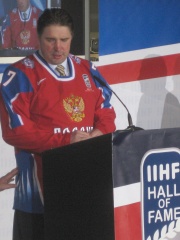
10. Alexei Kasatonov (b. 1959)
With an HPI of 54.21, Alexei Kasatonov is the 10th most famous Russian Hockey Player. Her biography has been translated into 20 different languages.
Alexei Viktorovich Kasatonov (Russian: Алексей Викторович Касатонов; born 14 October 1959) is a Russian former ice hockey defenceman, who was a long-time member of the Soviet Union national ice hockey team. He was inducted into the IIHF Hall of Fame in 2009.
People
Pantheon has 110 people classified as Russian hockey players born between 1921 and 1997. Of these 110, 87 (79.09%) of them are still alive today. The most famous living Russian hockey players include Vladislav Tretiak, Viacheslav Fetisov, and Alexander Ovechkin. The most famous deceased Russian hockey players include Valeri Kharlamov, Viktor Tikhonov, and Vladimir Petrov. As of April 2024, 14 new Russian hockey players have been added to Pantheon including Sergei Yashin, Sergei Svetlov, and Alexander Karpovtsev.
Living Russian Hockey Players
Go to all RankingsVladislav Tretiak
1952 - Present
HPI: 64.13
Viacheslav Fetisov
1958 - Present
HPI: 58.78
Alexander Ovechkin
1985 - Present
HPI: 58.52
Igor Larionov
1960 - Present
HPI: 57.05
Sergei Makarov
1958 - Present
HPI: 56.96
Alexander Yakushev
1947 - Present
HPI: 54.56
Alexei Kasatonov
1959 - Present
HPI: 54.21
Pavel Bure
1971 - Present
HPI: 53.81
Vyacheslav Starshinov
1940 - Present
HPI: 53.33
Andrei Khomutov
1961 - Present
HPI: 51.29
Alexander Mogilny
1969 - Present
HPI: 51.24
Pavel Datsyuk
1978 - Present
HPI: 51.15
Deceased Russian Hockey Players
Go to all RankingsValeri Kharlamov
1948 - 1981
HPI: 63.50
Viktor Tikhonov
1930 - 2014
HPI: 61.49
Vladimir Petrov
1947 - 2017
HPI: 56.57
Viktor Konovalenko
1938 - 1996
HPI: 54.15
Konstantin Loktev
1933 - 1996
HPI: 52.46
Veniamin Alexandrov
1937 - 1991
HPI: 51.27
Vladimir Shadrin
1948 - 2021
HPI: 51.13
Vladimir Vikulov
1946 - 2013
HPI: 51.00
Yuri Krylov
1930 - 1979
HPI: 50.97
Valentin Kuzin
1926 - 1994
HPI: 50.86
Yevgeni Babich
1921 - 1972
HPI: 50.56
Alfred Kuchevsky
1931 - 2000
HPI: 50.50
Newly Added Russian Hockey Players (2025)
Go to all RankingsSergei Yashin
1962 - 2022
HPI: 46.82
Sergei Svetlov
1961 - Present
HPI: 44.09
Alexander Karpovtsev
1970 - 2011
HPI: 42.80
Andrei Kovalenko
1970 - Present
HPI: 42.65
Vyacheslav Butsayev
1970 - Present
HPI: 40.72
Dmitri Yushkevich
1971 - Present
HPI: 40.58
Sergei Samsonov
1978 - Present
HPI: 39.41
Maxim Sushinsky
1974 - Present
HPI: 39.02
Ivan Tkachenko
1979 - 2011
HPI: 38.81
Oleg Kvasha
1978 - Present
HPI: 36.86
Nikita Klyukin
1989 - 2011
HPI: 32.63
Artem Zub
1995 - Present
HPI: 32.59
Overlapping Lives
Which Hockey Players were alive at the same time? This visualization shows the lifespans of the 21 most globally memorable Hockey Players since 1700.

